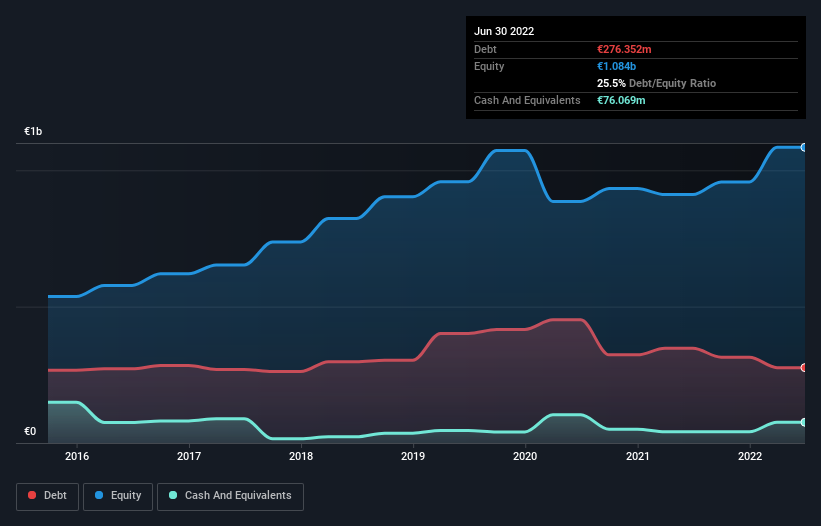Howard Marks put it nicely when he said that, rather than worrying about share price volatility, 'The possibility of permanent loss is the risk I worry about... and every practical investor I know worries about.' It's only natural to consider a company's balance sheet when you examine how risky it is, since debt is often involved when a business collapses. Importantly, Dalata Hotel Group plc (ISE:DHG) does carry debt. But the more important question is: how much risk is that debt creating?
What Risk Does Debt Bring?
Generally speaking, debt only becomes a real problem when a company can't easily pay it off, either by raising capital or with its own cash flow. In the worst case scenario, a company can go bankrupt if it cannot pay its creditors. However, a more frequent (but still costly) occurrence is where a company must issue shares at bargain-basement prices, permanently diluting shareholders, just to shore up its balance sheet. Of course, plenty of companies use debt to fund growth, without any negative consequences. When we think about a company's use of debt, we first look at cash and debt together.
Check out our latest analysis for Dalata Hotel Group
How Much Debt Does Dalata Hotel Group Carry?
You can click the graphic below for the historical numbers, but it shows that Dalata Hotel Group had €276.4m of debt in June 2022, down from €347.4m, one year before. However, because it has a cash reserve of €76.1m, its net debt is less, at about €200.3m.

How Healthy Is Dalata Hotel Group's Balance Sheet?
Zooming in on the latest balance sheet data, we can see that Dalata Hotel Group had liabilities of €143.2m due within 12 months and liabilities of €957.0m due beyond that. Offsetting these obligations, it had cash of €76.1m as well as receivables valued at €23.8m due within 12 months. So it has liabilities totalling €1.00b more than its cash and near-term receivables, combined.
This deficit casts a shadow over the €620.7m company, like a colossus towering over mere mortals. So we'd watch its balance sheet closely, without a doubt. After all, Dalata Hotel Group would likely require a major re-capitalisation if it had to pay its creditors today.
In order to size up a company's debt relative to its earnings, we calculate its net debt divided by its earnings before interest, tax, depreciation, and amortization (EBITDA) and its earnings before interest and tax (EBIT) divided by its interest expense (its interest cover). Thus we consider debt relative to earnings both with and without depreciation and amortization expenses.
Even though Dalata Hotel Group's debt is only 1.8, its interest cover is really very low at 2.3. This does have us wondering if the company pays high interest because it is considered risky. Either way there's no doubt the stock is using meaningful leverage. Notably, Dalata Hotel Group made a loss at the EBIT level, last year, but improved that to positive EBIT of €84m in the last twelve months. When analysing debt levels, the balance sheet is the obvious place to start. But it is future earnings, more than anything, that will determine Dalata Hotel Group's ability to maintain a healthy balance sheet going forward. So if you're focused on the future you can check out this free report showing analyst profit forecasts.
But our final consideration is also important, because a company cannot pay debt with paper profits; it needs cold hard cash. So it is important to check how much of its earnings before interest and tax (EBIT) converts to actual free cash flow. Over the last year, Dalata Hotel Group actually produced more free cash flow than EBIT. That sort of strong cash generation warms our hearts like a puppy in a bumblebee suit.
Our View
Mulling over Dalata Hotel Group's attempt at staying on top of its total liabilities, we're certainly not enthusiastic. But at least it's pretty decent at converting EBIT to free cash flow; that's encouraging. Once we consider all the factors above, together, it seems to us that Dalata Hotel Group's debt is making it a bit risky. That's not necessarily a bad thing, but we'd generally feel more comfortable with less leverage. There's no doubt that we learn most about debt from the balance sheet. But ultimately, every company can contain risks that exist outside of the balance sheet. For example - Dalata Hotel Group has 1 warning sign we think you should be aware of.
If, after all that, you're more interested in a fast growing company with a rock-solid balance sheet, then check out our list of net cash growth stocks without delay.
New: Manage All Your Stock Portfolios in One Place
We've created the ultimate portfolio companion for stock investors, and it's free.
• Connect an unlimited number of Portfolios and see your total in one currency
• Be alerted to new Warning Signs or Risks via email or mobile
• Track the Fair Value of your stocks
Have feedback on this article? Concerned about the content? Get in touch with us directly. Alternatively, email editorial-team (at) simplywallst.com.
This article by Simply Wall St is general in nature. We provide commentary based on historical data and analyst forecasts only using an unbiased methodology and our articles are not intended to be financial advice. It does not constitute a recommendation to buy or sell any stock, and does not take account of your objectives, or your financial situation. We aim to bring you long-term focused analysis driven by fundamental data. Note that our analysis may not factor in the latest price-sensitive company announcements or qualitative material. Simply Wall St has no position in any stocks mentioned.
About ISE:DHG
Dalata Hotel Group
Owns, leases, and manages hotels under the Maldron Hotels and Clayton Hotels brand names in Dublin, Regional Ireland, the United Kingdom, and Continental Europe.
Mediocre balance sheet second-rate dividend payer.
Similar Companies
Market Insights
Community Narratives



